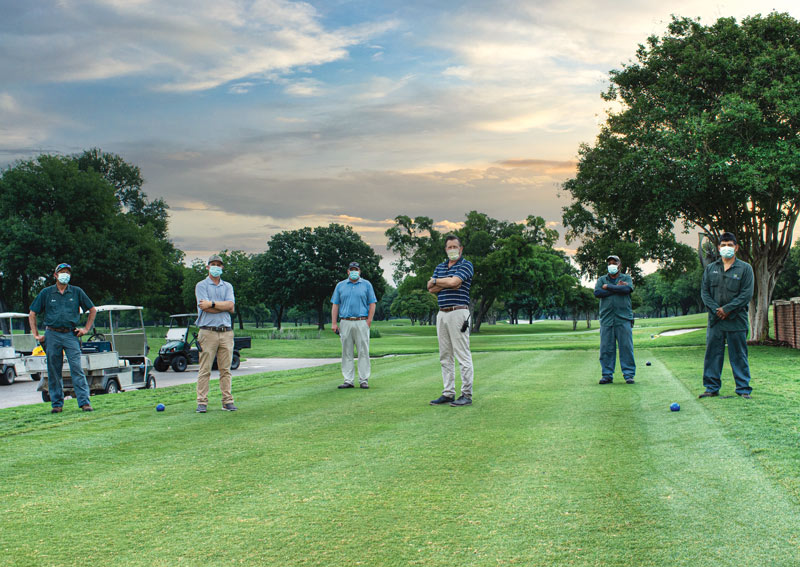
Wearing medical masks and adhering to social distancing guidelines, crew members at Colonial Country Club in Fort Worth, Texas, are preparing for the PGA Tour’s Charles Schwab Challenge June 11-14. From left: Mark Jones, horticulturist; Tyler Bryson, assistant superintendent; Bart Bellmon, assistant superintendent; Scott Ebers, CGCS; Jan Dixon, head mechanic; and Merced Sanchez, assistant mechanic. Photo by Geno Loro
Infrared thermometer in hand, Tyler Bryson awaits his co-workers.
Bryson is not in the medical field. He’s actually an assistant superintendent at Colonial Country Club in Fort Worth, Texas. Though he’s no doctor, he certainly has to act like one nowadays.
Standing 6 feet away from Bryson to comply with social distancing guidelines is assistant superintendent Bart Bellmon. As Bryson scans the foreheads of each member of the maintenance team, taking their temperatures with his handheld device as they arrive at the shop’s garage door, Bellmon’s gloved hand delivers each crew member a medical mask.
This is no one-time deal. Since winter turned to spring, it has been happening on Monday. And Tuesday. And Wednesday. Notice a trend?
“This is really strange,” says Bryson, a three-year GCSAA member. “You hope it all goes away and we get back to normal.”
The COVID-19 pandemic has tested the norm in all walks of life. Globally, its ramifications are a matter of life and already thousands of deaths. Now, as reopenings have begun in most of the U.S., there are signs again of what was once normal. In May, restaurants started to reopen. Barbershops and salons, too. Although baseball stadiums and NBA arenas remain dark, the time for a light to shine on golf is drawing near — and Colonial CC is squarely in one of the brightest spotlights in history.
The club and its superintendent, Scott Ebers, CGCS, find themselves at the forefront of a grand trial that will have some holding their breath and others jumping for joy. It could also potentially set the bar for not only professional golf but for other sports hoping to make a comeback amid one of the country’s most unfathomable challenges.
For the first time since the Players Championship was canceled March 12 following the first round of play at TPC Sawgrass in Ponte Vedra Beach, Fla., a high-level professional golf tournament in the COVID-19 era (which, at least for now, means no fans are allowed) is scheduled to return: the PGA Tour’s Charles Schwab Challenge, June 11-14 at Colonial CC.
“We’re kind of the guinea pigs,” Bryson says.
Other facilities that had been looking forward to hosting tournament golf this year, however, have not been as lucky as Colonial. For those courses, their superintendents and their maintenance teams, the show won’t be coming to town — and there is no guarantee it ever will.
At Colonial CC, the wait was a relatively brief one — the rescheduled dates are less than a month from the original dates of the event, May 21-24. And the longest-running host of a PGA Tour event played on its original site (since 1946) will retain its big event through at least 2022, thanks to its agreement with Charles Schwab.
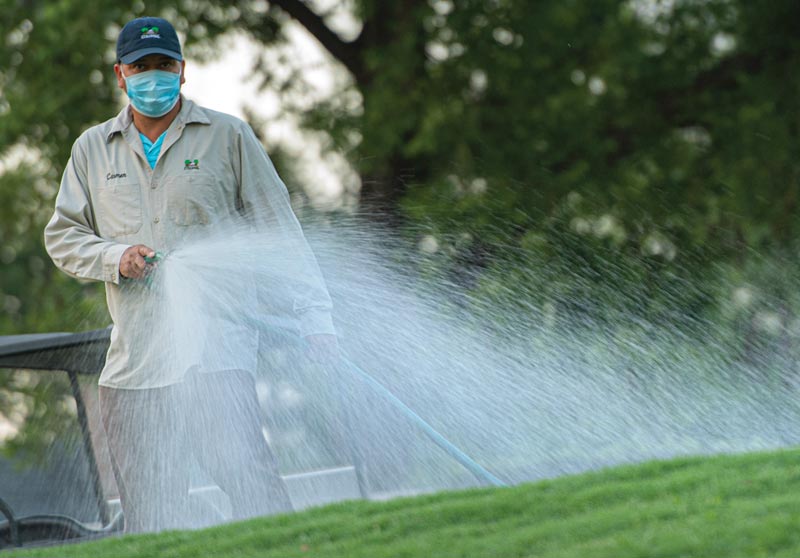
Colonial Country Club crew member Carmen Rubio on watering patrol. Photo by Geno Loro
Unfortunately, there is no such certainty for Quail Creek Country Club in Naples, Fla. For the second time since 2017, Quail Creek has had a USGA championship canceled (as of mid-May, that event, the U.S. Women’s Amateur Four-Ball, was one of six USGA championships to be canceled this year).
“Every time I talk about it, I get a little sadder and madder,” says Kevin F. Leo, Quail Creek’s director of golf courses and grounds.
At Colonial CC, anticipation is the prevailing emotion. Charles Schwab Challenge tournament manager Dennis Roberson imagines a sports-starved audience that has had to subsist on pro athletes playing virtual video games, reruns of Monday Night Football, and golf exhibitions with Tiger and Phil or Rory and DJ will come back in droves for what — fingers crossed — will occur this month in the Lone Star State. Roberson is confident viewers will like what Ebers has done under the unprecedented circumstances. “From my perspective, he’s always on top of his game,” Roberson says.
Same song, different verse at Quail Creek
Kim Benedict is disappointed. She was supposed to caddie for Tara Joy-Connelly in the U.S. Women’s Amateur Four-Ball at Quail Creek that had been slated for April 25-29.
The event’s cancellation wasn’t the sole reason for her sorrow, though. She was just as upset for Leo, a 30-year GCSAA member whose history at 36-hole Quail Creek dates back to when Ronald Reagan was president.
“Huge fan of Kevin,” says Benedict, who coached the Gulf Coast High School boys team in Naples to the state championship in 2017. “I could tell he and his crew had it (Quail Creek) ready to peak. The greens were going to be really, really quick. The course was on the right trajectory.”
Leo, 58, got his first taste of the golf industry at Quail Creek, during the club’s infancy. Fresh out of high school in 1981, he was on the construction team that built Quail Creek, helping the club’s first superintendent, Lloyd McKenzie, who had previously overseen Augusta National Golf Club. After working in numerous other industry positions, Leo returned to Quail Creek in 2013. Four years later, the club was scheduled to host the U.S. Women’s Mid-Amateur, but Hurricane Irma had other ideas, pummeling the region and forcing a venue change to Houston.
“We lost almost 4,000 trees. The whole community was wrecked,” Leo says. “People were without power. I feel the golf course would’ve been playable, but the community probably couldn’t have supported the championship. People were living in hotels. Not a good representation of what Naples would look like.”
Editor’s note: Read about Quail Creek’s recovery from Hurricane Irma.
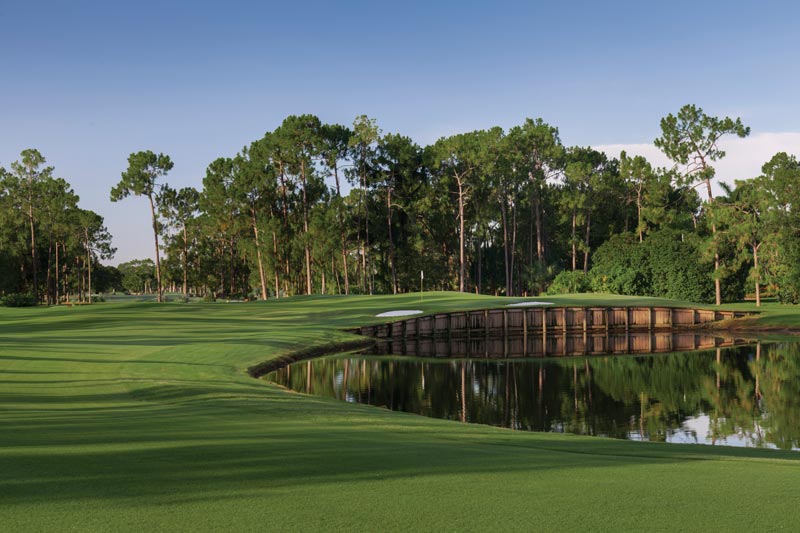
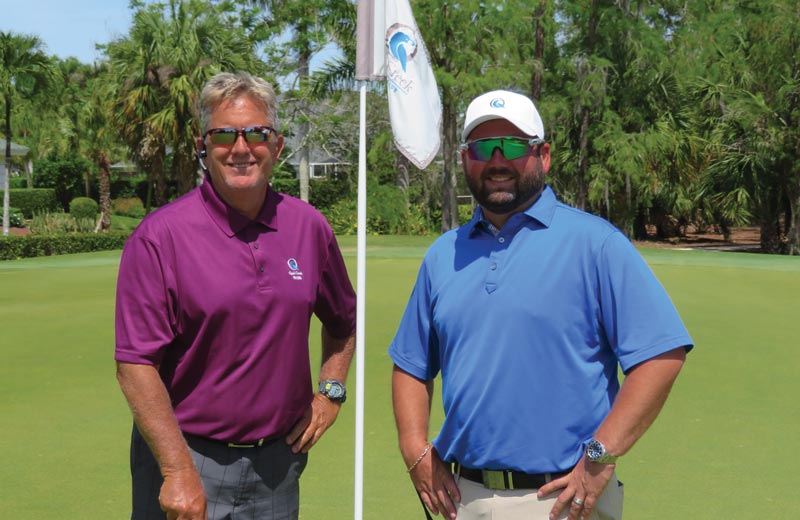
Quail Creek Country Club director of golf courses and grounds Kevin Leo (left) helped build the club. He and director of golf Jon Balyeat (right) learned in January 2019 that the club would be hosting a USGA championship in 2020. In March 2020, that event was called off because of coronavirus. Photos courtesy of the USGA (top) and Kevin Leo
Quail Creek didn’t wait long for another opportunity. One of those who led the charge to land the 2020 U.S. Women’s Amateur Four-Ball was Naples resident Brig. Gen. Edward Dyer, whose active-duty contributions include combat in Iraq.
“Some members were all for it. Some didn’t want to chance going through this again,” Leo says. “I saw it as a full shot at redemption. I really thought we could redeem ourselves and roll out the red carpet. The club had volunteers lining up from clubs all over Naples. This would’ve been better, a lot easier to pull off, because it was not in October (when the Women’s Mid-Amateur had been scheduled to take place in 2017). “Then when I heard COVID-19, I was like, ‘What’s that?’”
The plan had been to use the back nine from each of the Quail Creek’s two courses for the event. “They’re the two hardest nines, and they’re close together. Both nine and 18 of the Championship Course end up at the back of the clubhouse,” Leo says. Tree loss three years earlier had provided another boost — better turf quality from improved air circulation and greens exposed to full sun. Yet no improvements could conquer a virus that appears to have no boundaries.
On March 17, the USGA canceled its first two 2020 championships. The event at Quail Creek was first on the schedule.
Rachel Sadowski, championship director with the USGA, had to break the news to Quail Creek. “It was extremely difficult. Every club gets ready to host a championship, and it doesn’t come together in weeks or months. It takes years. To have to cancel it is the last thing you want to do,” Sadowski says. “That’s even harder, especially with Kevin. He’s truly become a friend of mine. It makes it that much harder that they’re going through that heartache twice.”
As for the club losing its second event in three years, Sadowski says, “Literally, it sounds like a fiction story.”
On April 29, the day the event was supposed to be down to its final two competitors, Leo phoned Sadowski to catch up and commiserate. Now the question is whether the USGA will come calling again. The next open date for the U.S. Women’s Amateur Four-Ball is 2022. Sadowski can’t make any promises, but she expects Quail Creek will get another look for some type of event. “We want them back on the calendar,” she says.
Whether the club hopes the third time is a charm, well ...
“It would be a hard sell to the membership,” Leo says. “They’ve gone through it twice.” Does Leo want another chance? “Hell yes.”
Letdowns in New England
Peter Bly rejoiced.
A mild winter had set the stage for a spectacular summer at Brooklawn Country Club in Fairfield, Conn. At a club designed by legendary golf course architect A.W. Tillinghast and where golf great Gene Sarazen launched his career as an apprentice clubmaker, Bly is an institution. The 64-year-old is only the third superintendent at Brooklawn, which became a USGA member in 1896.
The 2020 U.S. Senior Women’s Open was scheduled at Brooklawn July 9-12, part of a monumental year for the club, which is celebrating its 125th anniversary. “It was a great winter for us. Not much snow. No winter damage. It was like a long, extended fall,” Bly says. “We had a head start on everything because of no repair work. We just started growing.”
Brooklawn, though, was thwarted by COVID-19. The USGA canceled the Senior Women’s Open on April 6, and the same day, another historic facility suffered a similar fate: Newport (R.I.) Country Club, one of the five founding USGA clubs, which was to host the 2020 U.S. Senior Open June 25-28.
“We’ve had floods, hurricanes — nothing like this. It’s a whole new learning curve,” says Bly, a 39-year GCSAA member.
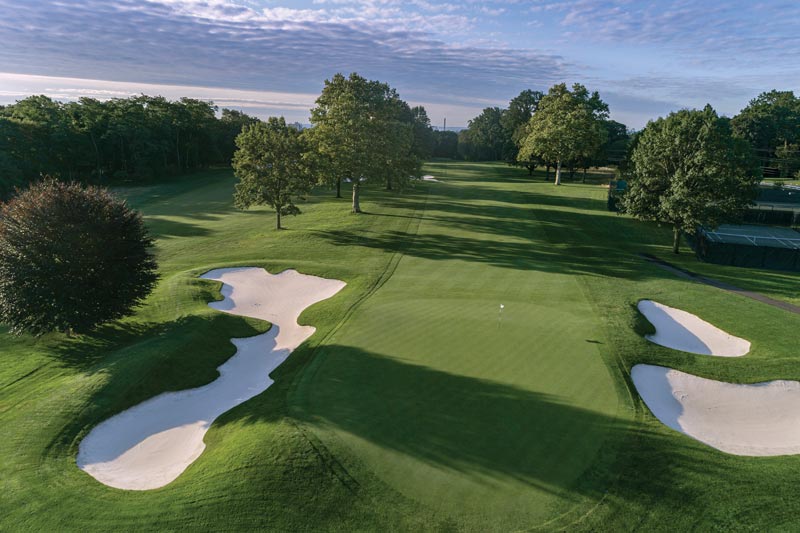
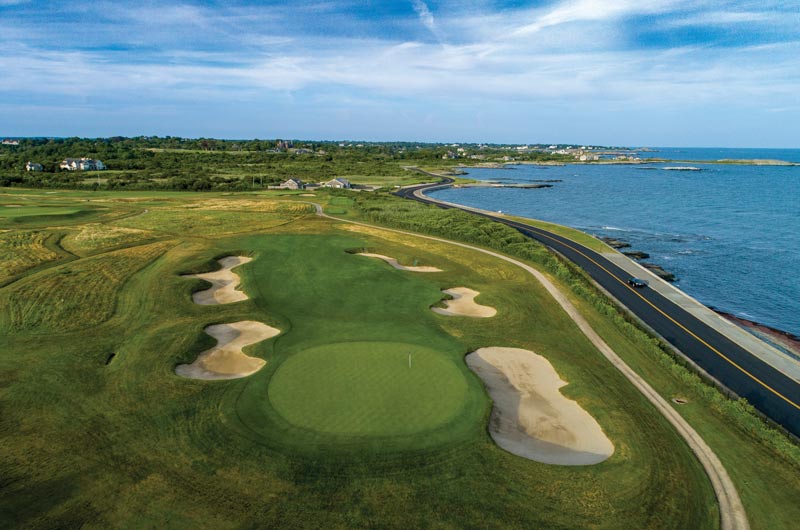
Top: Brooklawn Country Club in Fairfield, Conn., intended host of the 2020 U.S. Senior Women’s Open. Bottom: Newport (R.I.) Country Club was scheduled to host the U.S. Senior Open June 25-28. Photos courtesy of the USGA
Had the Senior Women’s Open been played, it would have been Brooklawn’s fifth USGA championship and first since the 2003 U.S. Girls’ Junior. What energized Bly was that some of the ladies who had played there in the 1979 U.S. Women’s Open were planning to return this time, including World Golf Hall of Famer Pat Bradley. “The event would have been part of live TV. It was a chance to get some recognition for what we do,” Bly says.
Bly’s staff, including longtime foreman Joe Silano and assistant Ben Goossen, were eager for the event too. “It’s a big bummer for me. I was looking forward to working the event and getting the experience,” Goossen says. “Selfishly, as an aspiring superintendent, I would love to have it on my résumé.”
Perhaps he’ll get another chance, as the USGA hasn’t announced a site for next year’s U.S. Senior Women’s Open. But whether it comes to Brooklawn in 2021 or whether the facility is considered for another USGA event down the road won’t alter Goossen’s objectives. “The disappointment is there, sure,” he says. “At the end of the day, you still have a golf course going forward.”
No fooling. “We’ve got summer coming. The member-guest is the end of June, member-member in July, the Archie Wheeler (a tournament named in honor of one of the club’s founders and a playing partner of Sarazen’s) in August, and the club championship Labor Day,” says Bly, who played junior golf against Sarazen’s grandson. “I don’t know where this (U.S. Senior Women’s Open) cancellation puts us in their (USGA) queue. Maybe they’ll circle back. All I know is, I’m not going anywhere. It’s a busy year ahead for me.”
Ready to go at Colonial Country Club
If the Charles Schwab Challenge comes off as hoped at Colonial, it will hardly resemble what we have come to expect from a PGA Tour event.
No spectators. No corporate hospitality. No skyboxes. No chalets. COVID-19 has precipitated a new and unusual look. The grounds, though, will be roped to assist with volunteer staging and TV cable lines. The only people allowed on the grounds, according to Roberson, will be those necessary to stage the tournament and/or support those individuals staging the event. That’s a list that includes PGA Tour personnel; Colonial staff, including the maintenance team; volunteers; key vendors; players, caddies and probably coaches and instructors; and limited media.
It seems reasonable to think Roberson is correct in predicting the Charles Schwab Challenge will be must-see TV. Ebers, a 27-year GCSAA member, understands the magnitude. “We are on the clock. It is a big deal. We’re excited to do it,” Ebers says.
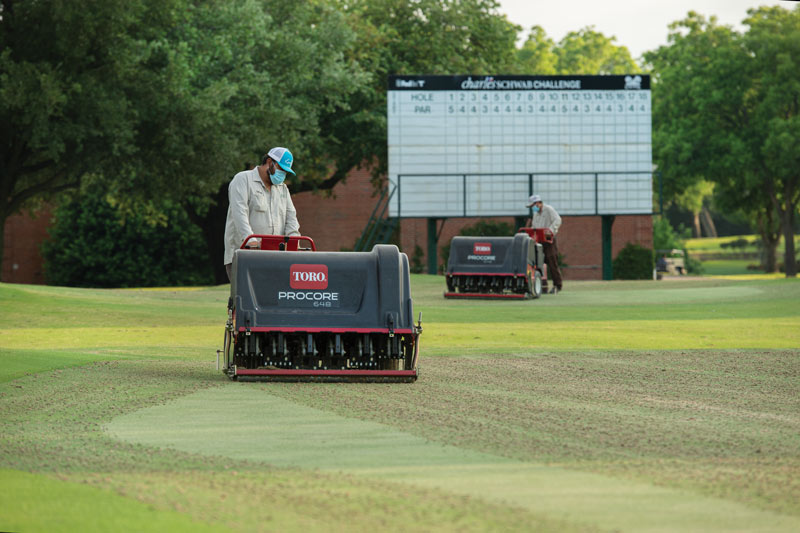
Colonial Country Club crew members Santiago Solis-Cruz (foreground) and Arturo Perez handled aerifying duties in early May 2020. Photo by Geno Loro
In preparation for it, Ebers’ crew has had to adjust. In addition to the morning health checks and dispersal of masks, the lunchroom is off-limits to ensure staff adheres to social distancing whenever possible. Instead, the crew is provided with boxed lunches. Disinfectants and hand sanitizers are readily available. “Otherwise,” Ebers says, “we’re preparing the golf course like we normally would.”
The new dates for the event do pose some challenges. The later date likely means warmer weather in North Texas, so the Colonial team is watching its A-4 bentgrass greens carefully. In late April, large fans were stationed on each green and were used if temperatures became abnormally warm.
Editor’s note: Get all the details about Colonial Country Club in GCSAA’s tournament fact sheet.
On the flip side, Ebers expects the absence of structures to make things easier. “Fewer moving parts to work around,” he says. The grounds outside the ropes also won’t endure a trampling from spectators as in past years. Roberson says that when the weather is good for the tournament, weekly attendance for the event can total up to 135,000.
Speaking of figures, Bellmon says Ebers has been taking a proactive approach to COVID-19 for quite a while. “He was paying attention to this when it was breaking out in China. He’s had his finger on the pulse of it, and a lot earlier than I would have or others would have,” says Bellmon, an 18-year GCSAA member. “We started looking then at whether we would be essential and maybe if we should do split crews. We disinfected machines every day and tried to determine if we had enough carts for one person per cart. He was thinking about stuff before things started shutting down.”
Ebers has shown he can handle adversity at Colonial, where he has worked since 2005. In 2015, he and his crew pulled off a minor miracle by overcoming 10 inches of rain in a two-week span before and during what was then known as the Crowne Plaza Invitational. The event finished as scheduled. Five years later, with the world watching, he expects his crew will again bring its “A” game.
“We’ll be fired up,” Ebers says.
After the tournament has left town, Bryson will continue checking his teammates with that thermometer. “I’d imagine we’ll be doing that for months and months,” Ebers says.
For his part, Bryson misses how he used to greet his co-workers pre-COVID-19, when close interaction was OK. “I’m a very personable guy and a big fan of high-fives and fist bumps,” Bryson says. “It’s difficult not being able to do those things.”
Howard Richman is GCM’s associate editor.